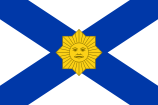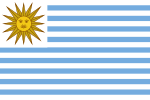Flag of Uruguay
 | |
| Name | The National Pavilion (Official) |
|---|---|
| Use | National flag and ensign |
| Proportion | 2:3 |
| Adopted | December 18, 1828 (First design) July 11, 1830 (Modification) |
| Design | Four horizontal stripes of blue with the upper hoist-side corner bearing the Sun of May in the center over a white canvas. |
| Designed by | Joaquín Suárez |
 Variant flag of Oriental Republic of Uruguay | |
| Use | Naval jack |
| Part of a series on the |
| Culture of Uruguay |
|---|
 |
| History |
|
The national flag of Uruguay (Spanish: Pabellón Nacional) is one of the three official flags of Uruguay along with the flag of Artigas and the flag of the Treinta y Tres. It has a field of nine equal horizontal stripes alternating white and blue. The canton is white, charged with the Sun of May, from which 16 rays extend, alternating between triangular and wavy.[1] The flag was first adopted by law on December 18, 1828, and had 19 stripes until July 11, 1830, when a new law reduced the number of stripes to nine.[2] The flag was designed by Joaquín Suárez.[2]
Symbolism and design[]
The horizontal stripes on the flag represent the nine original departments of Uruguay, based on the U.S. flag, where the stripes represent the original 13 colonies. The first flag designed in 1828 had 9 light blue stripes; this number was reduced to 4 in 1830 due to visibility problems from distance.
The golden Sun of May represents the May Revolution of 1810; the Sun of May is a figurative sun that represents Inti, the sun god and mythological founder of the Incan Empire. It also appears in the Flag of Argentina and the Coat of Arms of Bolivia.
Colors scheme[]
The specific color hues of the flag are not officially defined by law, however most representations use the following:
| Yellow | Brown | Blue | White | |
|---|---|---|---|---|
| RGB | 252-209-22 | 123-63-0 | 0-56-168 | 255-255-255 |
| Hexadecimal | #fcd116 | #7b3f00 | #0038a8 | #FFFFFF |
| CMYK | 0-17-91-1 | 0-49-100-52 | 100-67-0-34 | 0-0-0-0 |
Co-official flags[]
The National Pavilion shares its official status with two other flags, although it possesses a higher hierarchical position amongst them:
Historical banners[]
During Spanish rule:
Independence from Spain:

Flag of Provincias Unidas del Río de la Plata 1813-1816

Flag of Liga Federal between 1815-1817
Flag of Cisplatina, under Brazilian occupation between 1821 and 1825:
Uruguayan independence:
Historical flags[]

Flag of the Provincia Oriental
(1825–1828)
Flag of the Oriental State of Uruguay
(1828–1830)
Variations[]
During the Great Siege of Montevideo (1843–1851) Uruguay had two parallel governments, with two different flags:

Flag used by the Government of the Cerrito during the Uruguayan Civil War.

Flag used by the Government of the Defense during the Uruguayan Civil War.
Gallery[]

Flag in the historical Estadio Centenario, Montevideo.

Flag in the Estadio Centenario

Flag in Colonia del Sacramento

Flag in the Palacio Legislativo

Historical Flag from the 1924 Olympic Games
Flag in Otranto
See also[]
References[]
- ^ "Flag of Uruguay". The World Factbook. Central Intelligence Agency. Archived from the original on June 13, 2007. Retrieved June 27, 2007.
- ^ a b Smith, Whitney. "Uruguay, flag of". Guide to Hispanic Heritage. Encyclopaedia Britannica. Archived from the original on December 1, 2011. Retrieved June 27, 2007.
External links[]
| Wikimedia Commons has media related to National flag of Uruguay. |
- Flags of Uruguay
- National flags
- National symbols of Uruguay
- 1830 establishments in Uruguay

















